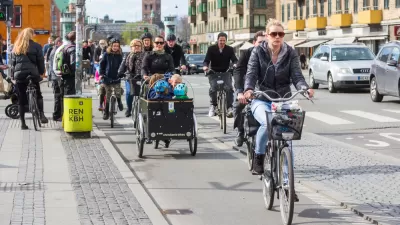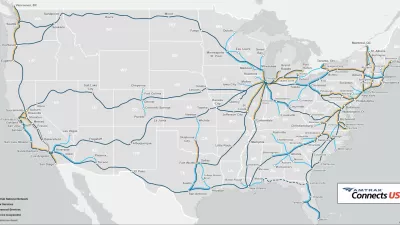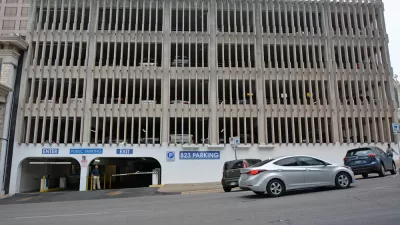Of the $568 billion in spending proposed by the "Republican Roadmap," $299 billion would go to infrastructure for cars.

The GOP has produced a response to the American Jobs Plan proposed by the Biden administration at the end of March. Republicans are proposing a $568 billion plan "that's focused on more traditional infrastructure like roads and bridges and doesn't have the corporate tax hikes that Democrats are seeking," according to an article by Steven T. Dennis and Laura Litvan.
The GOP infrastructure plan would double the amount spent on roads and bridges in the American Jobs Plan—to $299 billion. The messaging for the counterproposal, shared here in a Tweet by Politico reporter Sam Mintz, repeats the Republican resistance to the broader definition of infrastructure implied by the American Jobs Plan.
NEW: GOP senators publish $568 billion infrastructure framework, transportation-focused and heavy on highway funding, but also includes broadband and water infrastructure.
Still no pay-for details besides a general principle of user fees, and using leftover Covid bill money. pic.twitter.com/BNvYCxKeHV— Sam Mintz (@samjmintz) April 22, 2021
A Twitter thread by Urban Institute researcher Yonah Freemark details more about the consequences of the GOP infrastructure plan for non-automobile modes of transportation. Spoiler alert: the Biden plan is far friendlier to transit.
It turns out GOP proposal is worse for transit than I understood. @iduncan & others are reporting that it likely incorporates surface transport reauthorization, rather than being an add-on (which the Biden plan is). So $61b for transit is a decline compared to current spending. https://t.co/XAR9JNLbvn
— Yonah Freemark (@yfreemark) April 22, 2021
Republicans intend to pay for their plan with user fees for electric vehicles and by repurposing "unused federal spending" from the American Rescue Plan, according to a separate article by Alexander Bolton.
The Associated Press has also reported on the Republican infrastructure counter proposal.
FULL STORY: GOP Counters Biden With $568 Billion Infrastructure Plan

Planetizen Federal Action Tracker
A weekly monitor of how Trump’s orders and actions are impacting planners and planning in America.

San Francisco's School District Spent $105M To Build Affordable Housing for Teachers — And That's Just the Beginning
SFUSD joins a growing list of school districts using their land holdings to address housing affordability challenges faced by their own employees.

The Tiny, Adorable $7,000 Car Turning Japan Onto EVs
The single seat Mibot charges from a regular plug as quickly as an iPad, and is about half the price of an average EV.

Seattle's Plan for Adopting Driverless Cars
Equity, safety, accessibility and affordability are front of mind as the city prepares for robotaxis and other autonomous vehicles.

As Trump Phases Out FEMA, Is It Time to Flee the Floodplains?
With less federal funding available for disaster relief efforts, the need to relocate at-risk communities is more urgent than ever.

With Protected Lanes, 460% More People Commute by Bike
For those needing more ammo, more data proving what we already knew is here.
Urban Design for Planners 1: Software Tools
This six-course series explores essential urban design concepts using open source software and equips planners with the tools they need to participate fully in the urban design process.
Planning for Universal Design
Learn the tools for implementing Universal Design in planning regulations.
Smith Gee Studio
City of Charlotte
City of Camden Redevelopment Agency
City of Astoria
Transportation Research & Education Center (TREC) at Portland State University
US High Speed Rail Association
City of Camden Redevelopment Agency
Municipality of Princeton (NJ)





























